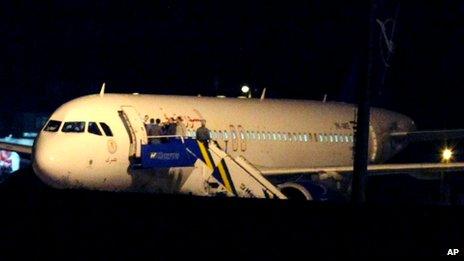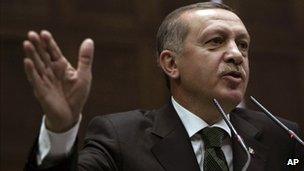What was Turkey's thinking behind plane interception?
- Published
- comments

Turkish jets forced the plane, coming from Moscow, to land in Ankara
Turkey's decision to force a Syrian airliner to land appears either to be the result of poor intelligence or of a deliberate strategy to undermine Syrian President Bashar al-Assad's government.
Either way it marked a further intervention in the civil war.
The reason given for taking the Syrian Airbus under F-16 escort to Ankara was that it was carrying weapons. It was flying from Moscow to Damascus, and the Syrian government denounced the move as "piracy".
Now after searching the aircraft, the Turkish government says it has found communications equipment. Walkie talkies perhaps? Turkish Prime Minister Recep Tayyip Erdogan insisted on Thursday night that the plane had been transporting Russian weapons, but neither claim has yet to be proven.

Prime Minister Erdogan's support for anti-Assad forces has proven controversial in Turkey
Under the circumstances, the reaction of Russia's foreign ministry has been muted, saying that it will seek a full explanation from Turkey and denying that it was carrying any weaponry.
Perhaps Russia is operating under that old principle of diplomatic chess that it is rude to interrupt your opponent while he is making a mistake.
There are though theories doing the rounds that the decision of Mr Erdogan's government to detain the plane is part of a wider strategy to de-stabilise the Assad regime.
Turkish airlines on Thursday announced that it considered Syrian airspace unsafe and would fly around it in future, and the chief of staff of the army, General Necdet Ozel, said that if last week's shelling of his country's territory by the Syrian army is repeated, his forces will, "respond more strongly".
Some observers in the Middle East are casting these latest Turkish moves as steps in an attempt to deny Syrian forces control of the border area and its airspace.
It may be that the Turkish government does indeed see them as being helpful to its allies in the Free Syrian Army, but the idea of Turkish artillery and air power creating some sort of liberated zone in the north of Syria is still a long way from being fulfilled.
Tricky balance
Mr Erdogan's policy of supporting the anti-Assad forces and working for the overthrow of the Syria regime has caused some controversy in Turkey.
Opponents argue that Turkey does not have the power to determine the outcome in its neighbour's civil war, but could prejudice other important relationships, including with Russia, by taking sides so obviously.
"This incident is the latest bitter fruit of the wrong and biased Syria policy which the [Erdogan] government has been following", Faruk Logoglu, deputy leader of the opposition Republican People's Party, said in response to the detention of the airliner.
Others have argued that aligning so closely with the Free Syrian Army will undermine the Turkish government's ability to mediate any kind of political settlement to the crisis.
The Turkish prime minister appears to be calculating that taking sides will stand him and the country in good stead with millions of Arabs who are angered by the Syrian government's continuing use of force against his own people.
It is a tricky balancing act though, because there will be many Syrians, even in the anti-Assad camp, that will not forget the role that Turkey has played in allowing arms shipments and rebel movements, fuelling the bloodshed in their country.